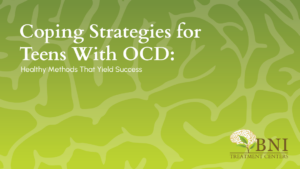Nothing is more disheartening to a parent than to see their teen son or daughter spiraling into addiction. Parents may envision their child’s future being compromised, even devastated, by the fallout of a substance use disorder problem. Eventually, a clear sense of urgency develops for finding help for their adolescent before too much damage is done. That concern is not unwarranted, with 70% of teens reporting using alcohol and 50% of teens admitting to using an illegal drug, according to the National Institute on Drug Abuse.
Filling the niche for teens with a drug or alcohol use disorder are treatment programs that are devoted and customized solely to this age bracket. This is important because the teen brain is not yet fully developed, making addiction treatment for this demographic different in significant ways. There are additional factors that are unique to the teen years, and these must be addressed as such within a program tailored for young people. Starting with an adolescent detox center and then into the active treatment phase, the teen addiction program should reflect the particular developmental characteristics of teens throughout treatment.
When is it Time to Seek Help at an Adolescent Detox Center?
A parent knows his or her own child. When trouble with substance use disorder enters the picture, there is usually a sense that something is up with their teen; something is off. That gut feeling is almost always something to pay close attention to. There are several signs and symptoms of a teen’s drug or alcohol experimentation or abuse. These might include:
- Teens may come home with clothing that smells of marijuana or with alcohol on their breath.
- Eyes can reveal drug or alcohol use. When using marijuana, eyes will be bloodshot, heavy-lidded, with constricted pupils. Heroin and opioids will also cause constricted pupils. Pupils will be dilated after drinking or using cocaine and other stimulants.
- Mood changes. Adolescence is marked by excess moodiness anyway, but if the teen becomes very withdrawn, depressed, agitated, anxious, or has wide mood fluctuations, it could be a sign of substance use disorder.
- Secretive behavior. Again, a certain desire for personal space and privacy is common during the teen years, but when your teen begins exhibiting shady, avoidant, isolating behaviors it is a sign of possible substance use disorder.
- Sudden change in weight. When your teen suddenly loses or gains weight for no apparent reason, it could be a sign of substance use disorder. Drugs like Adderall and methamphetamine can cause weight loss while abusing alcohol can lead to weight gain.
- Money missing. If you notice money disappearing from your wallet or any other items missing, it could be a sign the teen is engaging in drug use and financing it with your funds.
- Change in academic performance. If your teen’s grades begin to slip dramatically or the teen is ditching school, this is a sign they may be involved in drug or alcohol use.
About Adolescent Detox Centers and Treatment
Adolescent detox centers and rehabs will interview the teen to assess the substance use disorder treatment needs, as well as evaluate whether a co-occurring mental health disorder is present. The teen’s physical and mental health history will be reviewed as part of the intake process as well. The treatment plan will be determined by these findings, as well as an interview with the teen’s parents.
The first priority in treatment is to determine if the teen needs to undergo a medical detox or acute stabilization. Medical detox for an adolescent involves the process of ridding the body of the toxins related to the substance of use disorder under the supervision of medical addiction specialists. During detox, the teen will be closely monitored and provided medications that will help relieve uncomfortable withdrawal symptoms. Once detox and withdrawal have been completed, the teen will be ready for active participation in treatment.
A comprehensive approach will include one-on-one psychotherapy, group therapy, and addiction education. There are many evidence-based therapies that can be used for teen addiction treatment. One of the most effective is cognitive behavioral therapy (CBT), which can help the teen restructure the thought and behavior responses that have triggered the need to use substances. CBT teaches the adolescent to examine their self-destructive behavioral responses to certain disordered thought patterns and to use new coping tools to change them to healthy responses.
Treatment for teen substance use disorder focuses on the family dynamic, as this is the core social environment for an adolescent. For this reason, family therapy is an integral component of teen treatment plans. Teens may participate in a recovery support group, such as Teen Addiction Anonymous, that helps foster peer support during and following treatment.
BNI Treatment Centers Provide California Specialized Teen Treatment
BNI Treatment Centers is an interdisciplinary teen treatment program serving California. BNI Treatment Center is owned and operated by physicians specializing in psychiatry and addiction treatment. By treating the whole person, not just the diagnosis, BNI believes teens can rise above their difficulties with substance use disorder or mental health conditions and achieve their life’s potential. The holistic program elements include psychotherapy, surf therapy, music, dance, and art therapies, yoga and mindfulness exercises. For more information about the program, please contact BNI today at 888-522-1504.



